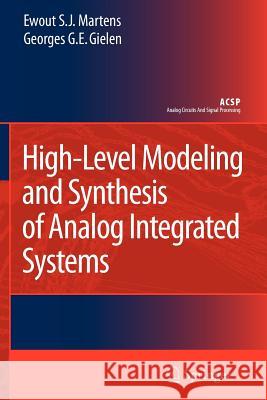High-Level Modeling and Synthesis of Analog Integrated Systems » książka
High-Level Modeling and Synthesis of Analog Integrated Systems
ISBN-13: 9789048177318 / Angielski / Miękka / 2010 / 275 str.
As the miniaturization of semiconductor technology continues, electronic s- tems on chips o?er a more extensive and more complex functionality with better performance, higher frequencies and less power consumption. Whereas digital designers can take full advantage of the availability of design auto- tiontoolstobuildhugesystems, thelackofsupportbycomputerprogramsfor di?erent abstraction levels makes analog design a time-consuming handcraft which limits the possibilities to implement large systems. Various approaches for?ndingoptimalvaluesfortheparametersofanalogcells, likeopamps, have been investigated since the mid-1980s, and they have made their entrance in commercial applications. However, a larger impact on the performance is - pected if tools are developed which operate on a higher abstraction level and consider multiple architectural choices to realize a particular functionality. In this book, the opportunities, conditions, problems, solutions and systematic methodologies for this new generation of analog CAD tools are examined. Theoutlineofthisbookisasfollows. Inthe?rstpart, thecharacteristicsof the analog design process are systematically analyzed and several approaches for automated analog synthesis are summarized. Comparison of their prop- ties with the requirements for high-level synthesis of analog and mixed-signal systems results in a new design paradigm: the high-level design ?ow based on generic behavior. This design approach involves a modeling strategy using generic behavioral models and a synthesis strategy leading to the exploration of a heterogeneous design space containing di?erent architectures. The modeling strategy is further elaborated in Part











